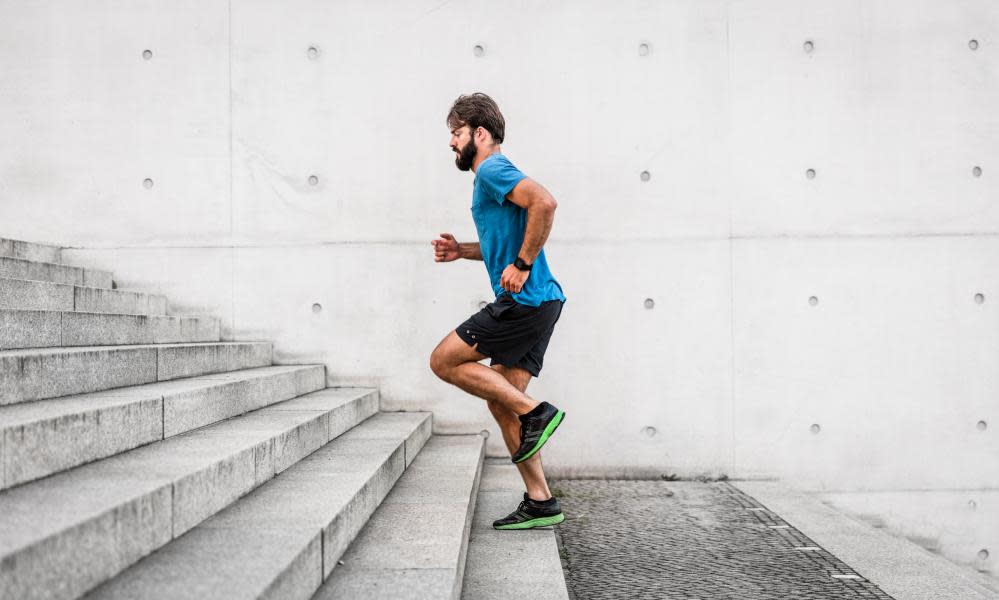I started running during lockdown and still hate it – what counts is I do it anyway

I have always hated exercise. Sport always seemed the perfect storm of suffering and tedium. For an “unco” kid like me, there would always be something more rewarding than chasing a ball around a field. Reading. Watching TV. Listening to music. Staring into space. As an adult I only excelled at endurance recreation – performing sleep deprivation and alcohol consumption to an Olympic standard.
There were people who exercised, I knew this. People who seemed to enjoy it, no doubt jacked up on endorphins and Powerade. Smug people. These were not my people. My people were bar hoppers, gig goers and film obsessives. Nocturnal folk who had as many words for hangovers as others have for snow. Sundays weren’t for running around parks but sleeping in, fried breakfasts and malingering through the double feature at St Kilda’s Astor theatre.
And yet, this Sunday morning, like almost every Sunday morning for the past two and a half years, I voluntarily ran a brisk 5km around my neighbourhood, while the kids cycled behind, grumbling about the hills. You may ask yourself: how did I get here?
I started running during the great second Melbourne lockdown, after my wife discovered the NHS’s Couch to 5K app. These were desperate times. We were only allowed out of the house for an hour a day. Also, I was aware that the heavy sourdough habit I’d picked up during the first lockdown was leading me towards an urgent wardrobe upheaval.
If there’s something I like about running – it’s a short list – it’s that it requires no technology or specialised equipment
The app allowed me to listen to my own music (a playlist of film scores I dubbed “You’re a big man, but you’re out of shape”) while the BBC DJ Jo Whiley popped up every now and then to tell me to start or stop or to promise me that, one day, I too would love running.
That day has never arrived.
Starting was torture. It was a bitter winter. It rained a lot. Running for 90 seconds felt like climbing Everest. The idea of running for 30 minutes felt like climbing to the moon – complete with total lack of oxygen. It’s not a love of running that has kept me going but the visceral memory of exactly how painful those early mornings were.
What I’ve realised since is that the gift of fitness isn’t to make exercise pleasurable but to make impossible things achievable. To transform your body from obstacle to enabler. My body soon went from a heavy thing I dragged around Albert Park Lake to something that bounced along on its own (even if it still made a worrying wheezing noise). That sourdough ballast came away with surprising ease, partly because running was so dreadful that I started looking at heavy food and couldn’t bear the thought of carrying it around the track.
As the novelty of running wore off, I learned to jettison the apps – those tools that strive to gamify exercise. Strava was useful when I started, helping ensure I was running far and fast enough but I realised its relentless comparisons were taking away what little fun there was. I would rather die than set foot in a gym or recruit a personal trainer, yet here I was using an app that was trying to make a solo pursuit into something competitive or performative.
If there’s something I like about running – it’s a short list – it’s that it requires no technology or specialised equipment.
You don’t need to recruit a team or be anywhere at the same time every week. All you need is half an hour and a pair of reasonable shoes. Over time I’ve even stopped listening to music and leave my phone at home. I no longer want to be distracted from how awful running is. I’ve learned to work with my body instead of against it, to listen to my breath and know whether to push myself or ease off.
In an age of digital detachment, where our avatars – and our identities – often feel more real than our physical selves, there is a liberation to actually being in your body. To be breath and blood and muscle. I take the kids with me on Sundays because I want them to learn that sooner than I did – and to learn that exercise doesn’t have to mean winners or losers but can bring a kind of freedom.
I also want them to learn that you don’t have to like exercise to keep doing it. Yes, it feels good to be fit and to be able to trust your body. Yes, it’s been good for my mental health. During a particularly stressful week, I found myself squeezing in an extra run, without really knowing why.
Those are reasons to continue. But I don’t think the main benefits of running – mental or otherwise – really have anything to do with running itself. It’s not remotely meditative. Most of my thinking is “oh God, this is awful” or little ear worm snippets of half-remembered songs.
Really, it isn’t the thing itself that matters but the awfulness of the thing. That magic “coming to love exercise” has never arrived but I’ve come to realise what counts is I do it anyway. I think often of a phrase used by the author Tegan Bennett Daylight – the difficulty is the point. That sums up running for me. Learning I can do something I hate three times a week has been the real boon. That and the smugness, obviously.
• Myke Bartlett is a writer, critic and reluctant runner

 Yahoo News
Yahoo News 
